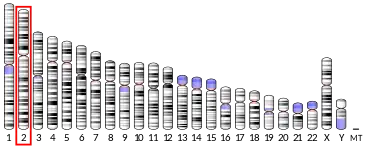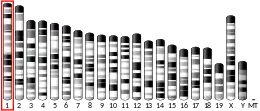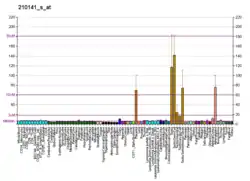INHA
Inhibin, alpha, also known as INHA, is a protein which in humans is encoded by the INHA gene.[5]
Function
The inhibin alpha subunit joins either the beta A or beta B subunit to form a pituitary FSH secretion inhibitor. Inhibin has been shown to regulate gonadal stromal cell proliferation negatively and to have tumour-suppressor activity. In addition, serum levels of inhibin have been shown to reflect the size of granulosa-cell tumors and can therefore be used as a marker for primary as well as recurrent disease. However, in prostate cancer, expression of the inhibin alpha-subunit gene was suppressed and was not detectable in poorly differentiated tumor cells. Furthermore, because expression in gonadal and various extragonadal tissues may vary severalfold in a tissue-specific fashion, it is proposed that inhibin may be both a growth/differentiation factor and a hormone.[6]
See also
References
- GRCh38: Ensembl release 89: ENSG00000123999 - Ensembl, May 2017
- GRCm38: Ensembl release 89: ENSMUSG00000032968 - Ensembl, May 2017
- "Human PubMed Reference:". National Center for Biotechnology Information, U.S. National Library of Medicine.
- "Mouse PubMed Reference:". National Center for Biotechnology Information, U.S. National Library of Medicine.
- Burger HG, Igarashi M (April 1988). "Inhibin: definition and nomenclature, including related substances". Endocrinology. 122 (4): 1701–2. doi:10.1210/endo-122-4-1701. PMID 3345731.
- "Entrez Gene: INHA inhibin, alpha".
Further reading
- Mellor SL, Richards MG, Pedersen JS, et al. (1998). "Loss of the expression and localization of inhibin alpha-subunit in high grade prostate cancer". J. Clin. Endocrinol. Metab. 83 (3): 969–75. doi:10.1210/jc.83.3.969. PMID 9506758.
- Munz B, Hübner G, Tretter Y, et al. (1999). "A novel role of activin in inflammation and repair". J. Endocrinol. 161 (2): 187–93. doi:10.1677/joe.0.1610187. PMID 10320815.
- Welt C, Sidis Y, Keutmann H, Schneyer A (2002). "Activins, inhibins, and follistatins: from endocrinology to signaling. A paradigm for the new millennium". Exp. Biol. Med. (Maywood). 227 (9): 724–52. doi:10.1177/153537020222700905. PMID 12324653. S2CID 19795772.
- Shav-Tal Y, Zipori D (2003). "The role of activin a in regulation of hemopoiesis". Stem Cells. 20 (6): 493–500. doi:10.1634/stemcells.20-6-493. PMID 12456957. S2CID 36242096.
- Shao L, Frigon NL, Young AL, et al. (1992). "Effect of activin A on globin gene expression in purified human erythroid progenitors". Blood. 79 (3): 773–81. doi:10.1182/blood.V79.3.773.bloodjournal793773. PMID 1310063.
- Vannelli GB, Barni T, Forti G, et al. (1992). "Immunolocalization of inhibin alpha-subunit in the human testis. A light- and electron-microscopy study". Cell Tissue Res. 269 (2): 221–7. doi:10.1007/bf00319612. PMID 1423490.
- Matzuk MM, Finegold MJ, Su JG, et al. (1992). "Alpha-inhibin is a tumour-suppressor gene with gonadal specificity in mice". Nature. 360 (6402): 313–9. doi:10.1038/360313a0. PMID 1448148. S2CID 4327163.
- Shimonaka M, Inouye S, Shimasaki S, Ling N (1991). "Follistatin binds to both activin and inhibin through the common subunit". Endocrinology. 128 (6): 3313–5. doi:10.1210/endo-128-6-3313. PMID 2036994.
- Mason AJ, Berkemeier LM, Schmelzer CH, Schwall RH (1990). "Activin B: precursor sequences, genomic structure and in vitro activities". Mol. Endocrinol. 3 (9): 1352–8. doi:10.1210/mend-3-9-1352. PMID 2575216.
- Barton DE, Yang-Feng TL, Mason AJ, et al. (1989). "Mapping of genes for inhibin subunits alpha, beta A, and beta B on human and mouse chromosomes and studies of jsd mice". Genomics. 5 (1): 91–9. doi:10.1016/0888-7543(89)90091-8. PMID 2767687.
- Lappöhn RE, Burger HG, Bouma J, et al. (1989). "Inhibin as a marker for granulosa-cell tumors". N. Engl. J. Med. 321 (12): 790–3. doi:10.1056/NEJM198909213211204. PMID 2770810.
- Mayo KE, Cerelli GM, Spiess J, et al. (1986). "Inhibin A-subunit cDNAs from porcine ovary and human placenta". Proc. Natl. Acad. Sci. U.S.A. 83 (16): 5849–53. doi:10.1073/pnas.83.16.5849. PMC 386393. PMID 3016724.
- Ramasharma K, Li CH (1987). "Characteristics of binding of human seminal alpha-inhibin-92 to human pituitary membranes". Proc. Natl. Acad. Sci. U.S.A. 84 (11): 3595–8. doi:10.1073/pnas.84.11.3595. PMC 304921. PMID 3035540.
- Murata M, Eto Y, Shibai H, et al. (1988). "Erythroid differentiation factor is encoded by the same mRNA as that of the inhibin beta A chain". Proc. Natl. Acad. Sci. U.S.A. 85 (8): 2434–8. doi:10.1073/pnas.85.8.2434. PMC 280011. PMID 3267209.
- Burger HG, Igarashi M (1988). "Inhibin: definition and nomenclature, including related substances". Endocrinology. 122 (4): 1701–2. doi:10.1210/endo-122-4-1701. PMID 3345731.
- Mason AJ, Niall HD, Seeburg PH (1986). "Structure of two human ovarian inhibins". Biochem. Biophys. Res. Commun. 135 (3): 957–64. doi:10.1016/0006-291X(86)91021-1. PMID 3754442.
- Stewart AG, Milborrow HM, Ring JM, et al. (1986). "Human inhibin genes. Genomic characterisation and sequencing". FEBS Lett. 206 (2): 329–34. doi:10.1016/0014-5793(86)81006-7. PMID 3758355. S2CID 21261385.
- Xu J, McKeehan K, Matsuzaki K, McKeehan WL (1995). "Inhibin antagonizes inhibition of liver cell growth by activin by a dominant-negative mechanism". J. Biol. Chem. 270 (11): 6308–13. doi:10.1074/jbc.270.11.6308. PMID 7890768.
- Nishihara T, Okahashi N, Ueda N (1994). "Activin A induces apoptotic cell death". Biochem. Biophys. Res. Commun. 197 (2): 985–91. doi:10.1006/bbrc.1993.2576. PMID 8267637.
- Mason AJ, Farnworth PG, Sullivan J (1997). "Characterization and determination of the biological activities of noncleavable high molecular weight forms of inhibin A and activin A". Mol. Endocrinol. 10 (9): 1055–65. doi:10.1210/me.10.9.1055. PMID 8885240.




